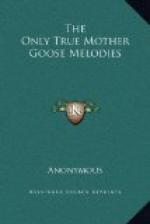The truth is that Boston was still a place of foreign commerce. Our ties with London, such as John Adams and other Revolutionaries spoke of so freely, still existed, and a Baby’s Song Book like Mother Goose, might still recall, and I suppose repeat, the song of Cockney homes.
So in the nursery, whether one of the North End sailors’ home, or of Beacon Street, or Park Street, or Pearl Street, the baby was sung to sleep with London ditties.
London Bridge is broken down,
Dance over, my Lady Lee,
London Bridge is broken down,
With a fair Ladye.
Will not some of the active literary clubs of St.
Ethelburger’s
Church in Bishopsgate, in East London, tell us what
this means:
You owe me five shillings,
Say the bells of St. Helen’s.
When will you pay me?
Say the bells of Old Bailey.
When I grow rich,
Say the bells of Shoreditch.
Pokers and tongs,
Say the bells of St. John’s.
Kettles and pans,
Say the bells of St. Ann’s.
Half-pence and farthings,
Say the bells of St. Martin’s.
All this was sung to New England children, thank God without note or comment, and with no other explanation. But the American traveler who goes into Baring Brothers’, Bishopsgate, with his credit, feels a thrill which the clerk who attends to him does not understand, if one speaks to him of St. Helen’s or St. Ann’s.
All this accounts for Mother Goose as Fleet reprinted her baby songs as early as the year 1700. But as the reader will see, somebody had the editing of the baby’s text book who was not afraid of his own time. I think that the very latest verses which will be found here are those of Scott’s Donald Dhu. Walter Scott wrote this for Campbell’s Anthology in 1816. The presence of these verses fixes the latest date of any lines in the collection, except, as Mr. Whitmore has observed, the line “Boston Town” is changed into “Boston City,” so that must have been written after 1822.
But it is interesting to see that no American line of comment seems to have slipped in. There was no lack of nationalism in the air, but I cannot find any reference to a cent[*], a dime, a governor, or a President. Now in the printed handkerchiefs, such as children used to buy on Election Day in the street, I remember the Ballad of John Gilpin ended,
Now, let us sing, “Long live the President
And
Gilpin, Long live he.”
But the wise editor of our Boston Mother Goose had
no such fears for the republicanism of his baby hearers.
Those were happy years in which the imagination of
babies and their older brothers and sisters were permitted
to run free.
[*][Note from Brett: See the rhyme which starts “Little Jack Nory...” for such a reference.]




